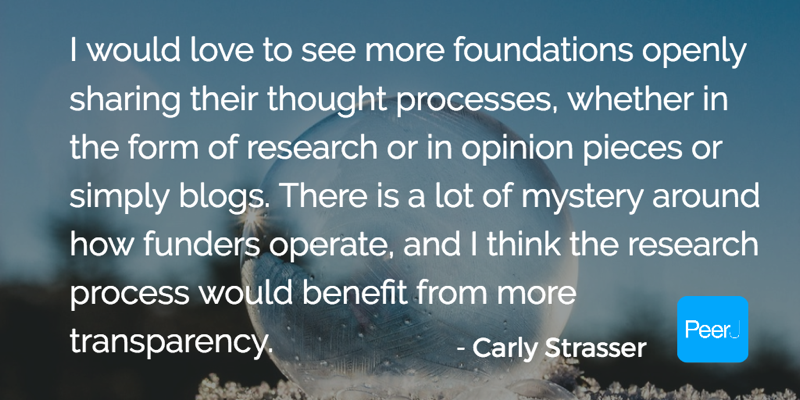Estimating the effects of open access policies: Author Interview with Carly Strasser of the Gordon and Betty Moore Foundation
Amyluv's bookmarks 2017-09-27
Yesterday we published ‘Estimated effects of implementing an open access policy for grantees at a private foundation‘ by Carly Strasser and Eesha Khare which looked at the effects of The Gordon and Betty Moore Foundation’s policy to require grantees to publish in open access journals. Research funders are increasingly adjusting their policies to ensure their researchers are sharing their work in publically accessible ways.
The researchers collected data on more than 2,000 publications in over 500 journals that were generated by GBMF grantees since 2001 and examined the journal policies to establish how open access policies might have affected grantee publishing habits. The research found that 99.3% of the articles published by GBMF grantees would have complied with a policy that requires open access within 12 months of publication. Based in part on this study, GBMF has implemented a new open access policy that requires grantees make peer-reviewed publications fully available within 12 months.
 Can you tell us a bit about yourself?
Can you tell us a bit about yourself?
I’m a Program Officer in the Science Program at the Gordon and Betty Moore Foundation. I work primarily on the Data-Driven Discovery Initiative, which promotes academic data science. Before joining Moore, I was a research data specialist at the California Digital Library, using my research background to help inform tool development and promote open science within the University of California system.
Can you briefly explain the research you published in PeerJ?
The Moore Foundation was exploring the possibility of implementing a new open access policy for publications resulting from the research that we fund. To better understand how it might affect grantees, we enlisted a summer intern (co-author Eesha Khare) to collect as much information as possible on the publications generated by our grantees in the last few years. This paper is the result of her work.
What kinds of lessons do you hope other foundations take away from the research?
I would love to see more foundations openly sharing their thought processes, whether in the form of research or in opinion pieces or simply blogs. There is a lot of mystery around how funders operate, and I think the research process would benefit from more transparency.
How did you first hear about PeerJ, and what persuaded you to submit to us?
I probably heard about it at a scholarly communication conference. We submitted to PeerJ first because it is open access, and second because it publishes similar types of research. I’m also personally interested in supporting new modes of research publishing, and PeerJ is one of the newer publishers that has shown interest in changing the norms of scholarly communication.
How was your publishing experience with us?
Great!
Do you have any anecdotes about your overall experience with us?
I really like the option to make the peer review process open after the article was accepted. I chose to do this.
Would you submit again, and would you recommend that your colleagues submit?
Absolutely.
